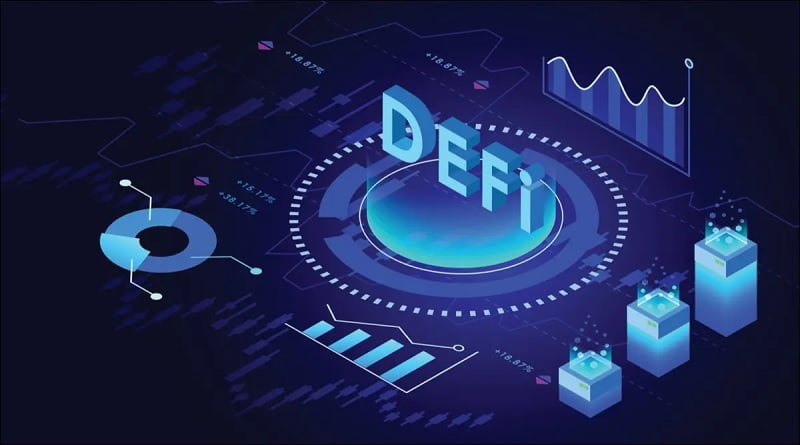WHAT IS DEFI? THE BASICS OF DECENTRALIZED FINANCE
Among the coverage of NFTs, Bitcoin, blockchains, and everything else cryptocurrency there is another term that is cropping up more and more: DeFi. What is it, and what does it mean to you? DeFi stands for “decentralized finance,” though it’s also known as “open finance.” It’s a financial system in which middlemen are removed and, like most things associated with Web3, is a utopian vision of a financial system that operates without a central authority.Instead, transactions would be governed by smart contracts and other peer-to-peer (P2P) technology, most importantly a blockchain.
Centralized Finance vs. Decentralized Finance
As the name suggests, decentralized finance is the opposite of centralized finance, which is the system we now operate under—at least most people do, most of the time. For example, if you buy something from an online store and pay with your credit card, the credit card company (Visa or Mastercard, usually) and your bank act as middlemen before the money ends up in the coffers of the shop you’re in.
In the scenario proposed by most proponents of DeFi, instead of using your card, you would use some form of cryptocurrency and circumvent the fees demanded by the credit card company and the bank. However, DeFi would extend to much more than just paying for online goods and services; it aims to take banks out of the equation entirely.
One good example are loans. Currently, to get a loan you need to go to a bank and jump through a number of hoops to qualify. Under DeFi, you could make a deal with somebody online, set down the terms and conditions in a smart contract and then go from there. Instead of dealing with a bank or some other kind of loan company, you’d just deal with another individual.
How DeFi Works
DeFi hinges on a few things to work, most importantly smart contracts and cryptocurrencies. Instead of the wildly volatile coins most people are familiar with—Bitcoin springs to mind—most DeFi applications would instead rely on so-called stablecoins like Dai or Tether. These currencies are usually pegged to an existing real-world fiat currency, often the U.S dollar, and generally don’t show the crazy spikes upward and downward of Bitcoin.
Smart contracts are also an interesting new development. The term “contract” is a little misleading as they’re not really contracts like in the real world. Instead, they’re decentralized apps, or dApps, existing on a blockchain (usually the Ethereum blockchain), self-contained little programs that fire when agreed-upon conditions are met—that’s the “smart” bit.
Conditions can be pretty simple, like a payment being transferred every first of the month, but they can be made as esoteric as the signatories would like. However, as these dApps exist on the blockchain, once the deal is made, it can’t be altered. If you made a deal to transfer 100 Tether every first of the month, it’ll fire every time unless you and your counterparty agree otherwise.
Problems With DeFi
The idea of cutting banks out of the financial equation probably sounds good to anybody who has had to pay some overdraft fee seemingly plucked from out of thin air or anybody else who has ever felt hard done by their bank—which is probably most of us. However, decentralizing your finances comes with a number of practical issues that are hard to ignore.
One big issue is the reliance on cryptocurrency. These currencies are inherently unstable, even stablecoins: Most stablecoins see some fluctuation over time, just not as dramatic as Bitcoin’s shifts. Still, it could make a serious difference, especially if the coin you’re paying a loan off in gets to be worth more, this would make your loan more expensive, a scary thought.
Another, maybe even bigger issue is that of smart contracts. While they have many benefits, there is the problem of enforcement: if you make a deal with your buddy to lend him $1000 and he doesn’t pay you back, you can drag him into court and get the money out of him that way. If somebody doesn’t honor their smart contract, you’re out of luck—this paper from Harvard Law goes into the details.
Sure their deed is on the blockchain for all to see, and maybe their reputation takes a hit, but the money is still gone and you can’t force payments like you would if you won a court case.
Adding to this issue is the fact that the whole crypto market has become a bit of a cesspool. Scams are common, and it’s far too easy to get away with not paying people or otherwise shirking payments and the like.
The upshot is that, as it exists now, DeFi is still very much a playground for people that like risk. If that’s not you, you may want to stay away from it for now, and crypto and NFTs in general—check out our article on the problem with NFTs for more on that. That said, if you like the cutting edge, then DeFi might be the place for you.








